WHY CONSIDER OVERDENTURES?
Conventional dentures don’t stay in place so many people don’t like wearing them. Their self-confidence will be affected as a loose denture can cause many embarrassing moments. Dental implants, on the other hand, keep the dentures in place while allowing you to carry on your daily activities with confidence.
There is no risk of the denture 'slipping' out of place.

Using dental implants, the denture can be stabilized, making it durable and effective long term. This method has been a success for many people and has the highest success rate of any implanted surgical device.
THE PROBLEMS WITH LOOSE DENTURES
As a result of poor, negligent oral hygiene many people around the world suffer from some form of tooth decay or damage, thus requiring the use of a denture. The main difficulty is to keep their denture secure mostly in the lower jaw. Some other embarrassing issues are slipping dentures, being unable to eat their favorite food and the frustrations of ineffective denture adhesives.
Fortunately, dental implants can be used to stabilize the denture so that it can work the way it was meant to.
BENEFITS OF DENTURE STABILIZATION
- Re-establishes correct chewing enabling a healthy diet and better health.
- Confidence and improvement in speech.
- Reduced irritation to the gums and better comfort.
- The existing denture can be utilized by a doing a few modifications.
- Save money spent on denture adhesives.
- The procedure is minimally invasive and recovery time is less.
ABOUT OVERDENTURES
Implants or posts, made of the bio-compatible metal titanium, are inserted into the jaw, and the bone will grow around these implants. Once healed, your denture can be adjusted to fix on to the implant abutment.
The denture can be removed for cleaning with an easy “snap"
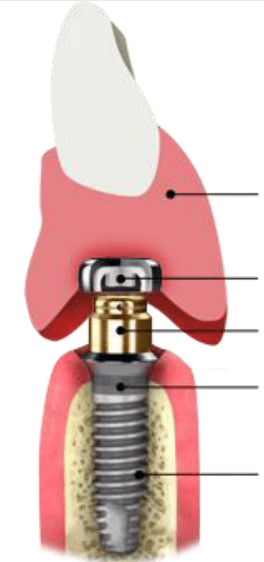
ANATOMY OF THE OVERDENTURE
The denture cap (which is modified for implants) will securely hold the denture in place. The material used for the abutment is a titanium alloy implant, which is the same material found in joint replacement implants; surface encourages integration with the bone as titanium is a bio-compatible metal.
FIXED DENTAL IMPLANT-SUPPORTED OVERDENTURE OVERDENTURE OPTIONS
In any elective procedure, the options available to you can be discussed with your doctor. Given are some options from which you can make your choice.
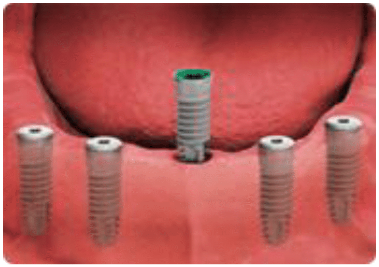
Dental implant placement
This type of implant is suitable if all your upper and lower teeth have been extracted. A custom-made denture is secured using dental implants. The number of titanium implants required will differ in each patient.

Custom made overdenture
A custom-made denture will be fabricated especially for you, and this will be fitted directly on to the implants. The holes in the overdenture will be concealed after the attachment is done.
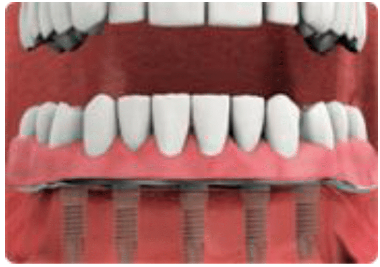
Over denture is attached
The implants will support the new denture firmly, to stimulate the jaw and maintain bone.
The denture is detachable for cleaning and maintenance by the dentist.
Removable dental implant-supported overdenture

Dental implant placement
If you are missing teeth in both your upper and lower jaws then multiple implants may be required to support a denture that is easily detachable for cleaning.

Custom overdenture created
Your dentist will have a custom-made bar fabricated to suit your bone structure and will attach to the dental implants to support the overdenture. Your existing denture can be modified and worn.

Attached custom overdenture
The new prosthetic will be firmly supported by the implants. This overdenture will have attachments that will snap or clip the denture into place. The implants will also help stimulate the jaw and maintain bone growth.
The denture is easily detachable for cleaning.
Dental implant-stabilized overdenture
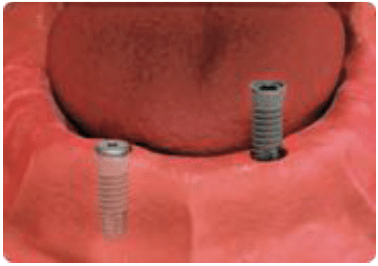
Dental implant placement
If all the teeth from your lower jaw have been extracted, a few implants can be used to stabilize your removable denture. This is a cost-effective solution.

Overdenture fitting
After the implants have been healed with the bone, abutment posts can be attached to them. Your existing denture maybe modified to fit the implants or a new denture may have to be fabricated.
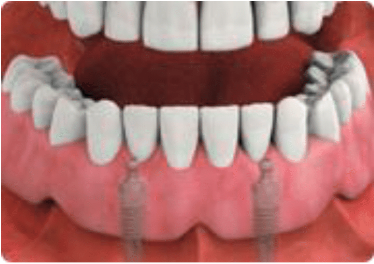
Overdenture attached
Your denture may be snapped into place, where it will be held in position by the dental implants and supported by soft tissue. And every night you can simply snap the denture out for cleaning.
Overdentures - what to expect
Treatment planning
Your dentist will obtain x-rays and create a model of your existing teeth to determine the position of the implants. Occasionally a bone or gum tissue graft will be required to create adequate room for the implants.
Implant placement
This procedure is relatively pain free. The dental implants will be placed into the bone, the gums and bone will be given time to heal before the denture is secured. Your existing denture can sometimes be modified to fit over the new dental implants allowing the denture to function and the implants to heal
Overdenture attachment
Depending on your treatment, the final denture maybe secured into place in one of two ways, your dentist will provide you with an overdenture that can be "snapped" into place on to your dental implants. If, you have selected a more advanced method of treatment then your overdenture will be secured into place using screws that fit into the dental implants.
Are you a good candidate for an overdenture?
Dental implants - these can be placed into most adults. But due to certain uncontrolled medical condition the effectiveness of the implant treatment may decrease.
So, initially make sure to discuss your health conditions with the doctor. Only a trained clinician can determine the ideal treatment plan. The treatment results may vary in individual patients. Discuss the risks and benefits of getting dental implants with your doctor and see if this type of treatment will be beneficial to you.
Implants and insurance
Dental implants cost more than conventional treatment options. Insurance policies may differ from individual companies but most cover a part of the restorative procedure. Financing plans may be available with competitive interest rates, and tailor-made payment plans can be arranged. So, contact your insurance agent for more information before going ahead with your treatment plan.


